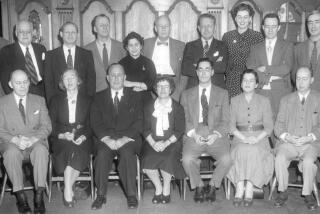SCIENCE FICTION
- Share via
GEODESIC DREAMS by Gardner Dozois (St. Martin’s Press: $19.95 ; 271 pp.) Gardner Dozois in recent years has channeled into his editing (Asimov’s SF Magazine and a year’s-best anthology) the creative drive that earlier produced some of the field’s finest short fiction. Gardner’s voice was always unmistakably his own. He could get inside others’ heads and look out at you from in there; he made you feel his characters’ pain as few could; and (as Bob Silverberg points out in his introduction) he demonstrated a rare devotion to the craft of writing, creating lines, sentences and paragraphs so well-turned, so defining as to seem almost hammered from metal.
Literary, like other salvage, is uncertain occupation. The dredge hauls up time’s garbage and bleached remains far more often than treasures, and even the treasures may be of purely historical worth. But make no mistake: These stories, most of them, are treasures, and of lasting value.
The book’s first story, “Morning Child,” is virtually a prototype Dozois story. Something, a terrible disruption, has occurred. A man and (we assume) his child are visiting a scene from their past. But nothing is as it seems. The child ages at an alarming rate. And only at the story’s end, after all the necessary, practical things have been taken care of (and after Dozois has stabbed you with a final revelation), does the man let go of his pain and “slowly, passionately, soundlessly” weep.
“Dinner Party” builds, painfully, to similar revelation: a moment of pure ice. And in “A Kingdom by the Sea,” perhaps the single strongest story Dozois has written, underachiever Mason looks for a moment into the eyes of his redemption, the only thing that will ever bring meaning or relief to his life, before he destroys it.
One of Dozois’ minor contributions as an editor was his coining of the word cyberpunk for what such writers as William Gibson, Bruce Sterling and Marc Laidlaw had begun turning out: high-tech, glitzy, gloomy stuff, continuing old romantic adventure traditions, yet also deeply influenced by pop culture. Its prose was often pyrotechnic and (like Bester and Delany) it was packed full of baroque turns and ideas.
Cyberpunk by now, of course, has been absorbed into the science-fiction mainstream, greatly enriching it--which is the whole point of such movements.
More to Read
Sign up for our Book Club newsletter
Get the latest news, events and more from the Los Angeles Times Book Club, and help us get L.A. reading and talking.
You may occasionally receive promotional content from the Los Angeles Times.








